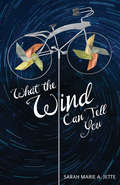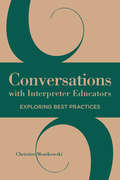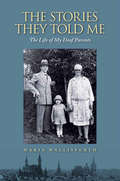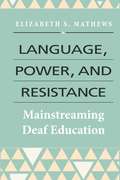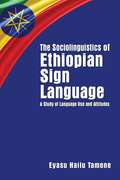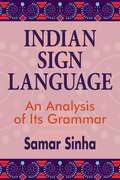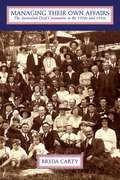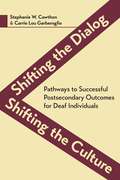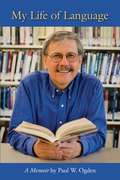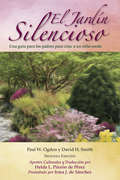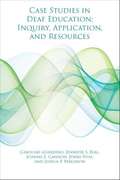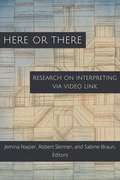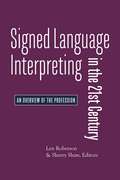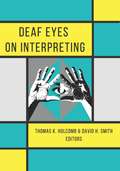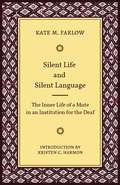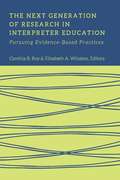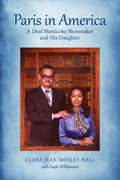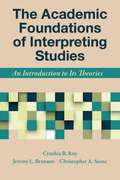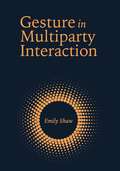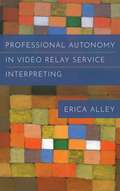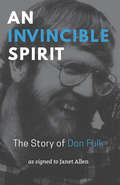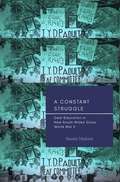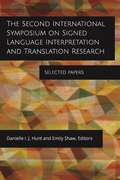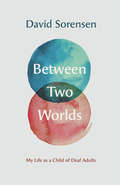- Table View
- List View
What the Wind Can Tell You
by Sarah Marie JetteIsabelle is fascinated by wind. And this year, she’s determined to win the middle school science fair with her wind machine. She’s just as determined to have her brother, Julian, who lives with a severe form of epilepsy and uses a wheelchair, serve as her assistant. But after Julian has a grand seizure, everything changes. Isabelle is suddenly granted entry into Las Brisas, a magical world where Julian’s physical limitations disappear, and one, she discovers, that he visits every night. The more Isabelle explores Las Brisas, the more possibilities she sees—for Julian, and for herself—and the more she finds herself at odds with her parents. Debut author Sarah Marie A. Jette has told, with remarkable insight and humor, a powerful story of a family struggling to love without fear.
Conversations with Interpreter Educators: Exploring Best Practices
by Christine MonikowskiSign language interpreter education is a relatively young field that is moving toward more theory-based and research-oriented approaches. The concept of sharing research, which is strongly encouraged in this academic community, inspired Christine Monikowski to develop a volume that collects and distills the best teaching practices of leading academics in the interpreting field. In Conversations with Interpreter Educators, Monikowski assembles a group of 17 professors in the field of sign language interpretation. Through individual interviews conducted via Skype, Monikowski engages them in informal conversations about their teaching experiences and the professional publications that have influenced their teaching philosophies. She guides each conversation by asking these experts to share a scholarly publication that they assign to their students. They discuss the merits of the text and its role in the classroom, which serves to highlight the varying goals each professor sets for students. The complexity of the interpreting task, self-reflection, critical thinking, linguistics, backchannel feedback, and cultural understanding are a sampling of topics explored in these exchanges. Engaging and accessible, Monikowski’s conversations offer evidence-based practices that will inform and inspire her fellow educators.
The Stories They Told Me: The Life of My Deaf Parents
by Cornelia Wallisfurth Maria WallisfurthIn this heartfelt memoir, Maria Wallisfurth recounts the lives of her deaf parents in Germany from the turn of the twentieth century through the 1930s. Her mother, Maria Giefer, was born in 1897 and her father, Wilhelm Sistermann, was born in 1896. The author captures the seasonal rhythms and family life of her mother’s youth in rural Germany, a time filled as much with hardship as it is with love. When she is old enough, she moves to the nearby city of Aachen to attend a school for deaf children, where she learns to lipread and speak. After her schooling is complete, she returns home to work on the family farm and experiences the privations and fear that accompany World War I. She later goes back to Aachen, where she joins a deaf club and falls in love with Wilhelm, a painter and photographer who was raised in the city. Amidst high unemployment, food shortages, and rapid inflation, the two are married in 1925 and two years later the author is born. Under the Nazi regime, Maria and Wilhelm are ordered to undergo forced sterilization. Although their deafness is not hereditary and they submit applications of protest, they are compelled to comply with the law. Despite their dissimilar backgrounds and the political circumstances that roiled their lives, the author’s parents showed great love for each other and their only daughter. The Stories They Told Me is a richly detailed document of time and place and a rare account of deaf lives during this era.
Language, Power, and Resistance: Mainstreaming Deaf Education
by Elizabeth S. MathewsThe current policy of educating d/Deaf and h/Hard of hearing (DHH) students in a mainstream setting, rather than in the segregated environments of deaf schools, has been portrayed as a positive step forward in creating greater equality for DHH students. In Language, Power, and Resistance, Elizabeth S. Mathews explores this claim through qualitative research with DHH children in the Republic of Ireland, their families, their teachers, and their experiences of the education system. While sensitive to the historical context of deaf education, Mathews focuses on the contemporary education system and the ways in which the mainstreaming agenda fits into larger discussions about the classification, treatment, and normalization of DHH children. The research upon which this book is based examined the implications that mainstreaming has for the tensions between the hegemonic medical model of deafness and the social model of Deafness. This volume explores how different types of power are used in the deaf education system to establish, maintain, and also resist medical views of deafness. Mathews frames this discussion as one of power relations across parents, children, and professionals working within the system. She looks at how various forms of power are used to influence decisions, to resist decisions, and to shape the structure and delivery of deaf education. The author’s findings are a significant contribution to the debates on inclusive education for DHH students and will resonate in myriad social and geographic contexts.
The Sociolinguistics of Ethiopian Sign Language: A Study of Language Use and Attitudes
by Eyasu Hailu TameneEthiopian Sign Language (EthSL) emerged relatively recently; its development is closely tied to the establishment of the first school for deaf students in Addis Ababa by American missionaries in 1963. Today, EthSL is used by more than a million members of the Ethiopian Deaf community, but it remains an under-researched language. In this work, Eyasu Hailu Tamene presents a groundbreaking study of EthSL that touches on multiple aspects of Deaf people’s lives in Ethiopia. Tamene collects data from three principal groups of people: deaf participants, teachers of deaf students, and parents of deaf children. He examines EthSL use within families, in formal and informal settings, and in various community spaces. He documents the awareness among different groups of the services available for deaf people, such as sign language interpreters and Deaf associations. He finds that members of the Deaf community show positive attitudes toward the use of EthSL and investigates the factors that impact those attitudes. His work indicates that there are still critical gaps in recognition and support for the use of EthSL, which can pose a threat to the vitality of the language. The Sociolinguistics of Ethiopian Sign Language will help to advance public understanding of EthSL and contribute to improved educational and social outcomes for the Deaf community in Ethiopia.
Indian Sign Language: An Analysis of Its Grammar
by Samar SinhaSamar Sinha presents pioneering research into the grammatical properties of Indian Sign Language (ISL), a language used by members of the Deaf community in India. This detailed and well-illustrated study describes the grammar of ISL and is supplemented by comparative and theoretical analyses in the core areas of sublexical structure, morphology, and syntax. Sinha offers a field-based, comprehensive analysis that covers topics such as o sign formation parameters o syllable structure o sonority hierarchy o semantics of space o pluralization strategies o phi-features o indexing and localization o agreement o word order He provides a description of the Indian Deaf community that serves to frame his analysis of ISL and highlights the need for greater awareness and acknowledgment of the language and its users. The lack of research on ISL in Indian academia has slowed efforts toward the standardization of ISL and the development of pedagogical materials. This work adds to the growing understanding of natural human language in general and ISL in particular. It also contributes to the empowerment of the Deaf community in India and will strengthen the efforts carried out by d/Deaf activists and researchers.
Managing Their Own Affairs: The Australian Deaf Community In The 1920s And 1930s
by Breda CartyManaging Their Own Affairs explores how Deaf organizations and institutions were forged in Australia during the early 20th century. During this period, deaf people challenged the authority of the dominant welfare organizations, or Deaf Societies, which were largely controlled by hearing people and run as charitable institutions. Breda Carty comprehensively documents the growth of the Australian Deaf community and Australian Deaf organizations for the first time. She focuses on both the political developments of the early 20th century and on the nature of the relationships between deaf and hearing people. During this time, deaf Australians aspired to manage their own affairs. They enjoyed some success by establishing “breakaways” from the Deaf Societies, and they also established an independent national organization, which was contested and ultimately suppressed by the Deaf Societies. These developments were influenced by wider social movements in Australian society, such as the mobilization of minority groups in their push for autonomy and equal rights. Although most of the breakaway Deaf organizations did not survive beyond the 1930s, they significantly affected the power structures and relationships between deaf and hearing people in Australia. The Australian Deaf community’s attempts to organize independently during these years have been largely erased from collective memory, making Carty’s examination a particularly important and necessary addition to the historical literature.
Shifting the Dialog, Shifting the Culture: Pathways to Successful Postsecondary Outcomes for Deaf Individuals
by Stephanie W. Cawthon Carrie Lou GarberoglioIn this volume, Stephanie W. Cawthon and Carrie Lou Garberoglio discuss the individual and systemic factors that both facilitate and inhibit the attainment of postsecondary education, training, and career goals for deaf individuals. Real-life examples and current research are combined in this consideration of the interactions between individuals and the many layers of the overall system in which they navigate. In addition to using a systems theory approach, the authors employ resiliency models that emphasize how deaf individuals persist through the transition process amidst the barriers that reside within larger educational and social systems. Employment, independent living, and community involvement are a few of the postsecondary outcomes that are covered. Shifting the Dialog, Shifting the Culture addresses critical issues that influence how deaf individuals reach their postsecondary goals and is designed for a diverse audience that includes professionals who work (or are training to work) with deaf individuals, policy makers, as well as federal and state personnel.
My Life of Language: A Memoir
by Paul W. OgdenPaul W. Ogden has dedicated his life to educating young deaf and hard of hearing people and raising awareness of what it means to be deaf in a hearing world. He has taught and mentored a generation of teachers, and his classic volume, The Silent Garden, has served as a guide for parents and educators for over thirty years. Now he tells his personal story of challenges faced and lessons learned, revealing that the critical, guiding factors for him have always been language and successful communication. Born in a time when many deaf children had no access to language, Paul learned spoken and written language skills at a young age through the painstaking efforts of his mother. His tight-knit family, which included one deaf and two hearing older brothers, facilitated open and constant communication using a variety of methods. His father was a pastor who was involved in the civil rights movement. Despite the family’s closeness, his father struggled with depression, an illness that would take the life of one of Paul’s brothers. As a student at a residential deaf school where the use of American Sign Language (ASL) was suppressed, Paul continued to build on the speech and lipreading skills he had learned at home. He returned home for high school and graduated as co-valedictorian—unaware of the standing ovation he received as he walked to the podium. Following a rewarding experience as an undergraduate at Antioch College, Paul went on to earn a PhD from the University of Illinois, a rare accomplishment for a deaf person at that time. During his graduate studies, he finally had the opportunity to learn ASL. As an award-winning professor of Deaf Studies at California State University, Fresno, he successfully petitioned for the university to recognize ASL as a language, and he established the Silent Garden program, which has grown into a flourishing provider of training and resources to support the Deaf community. In My Life of Language, Paul offers eloquent reflections on both the joyful and difficult periods of his life as he navigated relationships, faced discrimination, questioned his faith, and found great happiness in his marriage.
El Jardín Silencioso: Una guía para los padres para criar a un niño sordo
by David H. Smith Paul W. Ogden Helda Pinzón de Pérez Irma J. SánchezDurante más de treinta años, The Silent Garden les ha ofrecido a los padres de niños sordos todo el apoyo y la información imparcial que necesitan para que sus hijos desarrollen su pleno potencial. Esta nueva edición en español, que contiene los cinco primeros capítulos de la tercera edición actualizada en inglés, aporta ayuda a los padres para afrontar aquellos retos tan únicos y complejos a los que se enfrentan. De un modo accessible, práctico y, sobre todo, imparcial, El Jardín Silencioso pone al día a los padres rápida y minuciosamente sobre los muchos y contradictorios puntos de vista que existen acerca del bienestar de los niños sordos. Los autores Paul W. Ogden y David H. Smith, ambos sordos, presentan ejemplos y estudios que les servirán de guía a los padres en un ámbito que a la mayoría les es desconocido. El Jardín Silencioso expone temas como el de las estrategias que los padres pueden adoptar para abordar la situación, el de cómo crear un ambiente familiar sano, el de cómo fomentar la independencia y el de cómo tener en cuenta el punto de vista de los hermanos del niño sordo. Cada tema viene acompañado de historias auténticas que enriquecen la discusión. Siempre en tono alentador, El Jardín Silencioso les otorga recursos a los padres para que se conviertan en los mejores defensores de sus hijos. A lo largo del libro, los autores destacan que cada opción se adhiere a una situación personal diferente y ponen hincapié en que todos los niños sordos tienen la capacidad de llevar una vida enriquecedora, productiva y estimulante. For over 30 years, The Silent Garden has offered parents of deaf children the support and unbiased information needed to fully realize their children’s potential. This new Spanish edition, which contains the first five chapters of the completely updated 3rd English edition, will help parents navigate the complex and unique challenges they face. Accessible, practical, and, above all, open-minded, El Jardín Silencioso educates parents quickly and thoroughly about the many conflicting points of view on what is best for their deaf children. Authors Paul W. Ogden and David H. Smith, who are both deaf, present examples and research that guide parents through often unfamiliar territory. El Jardín Silencioso covers the topics of communication, coping mechanisms for parents, creating healthy family environments, fostering independence, and understanding the perspectives of siblings. Always encouraging, El Jardín Silencioso empowers parents to be the best advocates for their deaf children.
Case Studies in Deaf Education: Inquiry, Application, and Resources
by Caroline Guardino Jennifer S. Beal Joanna E. Cannon Jenna Voss Jessica P. BergeronCase Studies in Deaf Education provides comprehensive materials that will prepare prospective teachers to work with the diverse spectrum of students who are d/Deaf and hard of hearing (d/Dhh) and empower them to better understand these complex and unique learners. The text presents an extensive series of case studies that are balanced and unbiased in both language and instructional approaches and that encourage readers to use background details, academic data, and evidence-based practices to make informed educational decisions. The authors address the diversity of d/Dhh students by examining a multitude of learner characteristics that influence communication and educational services. These characteristics and their interactions include a student’s background experiences, language and communication mode (sign and/or listening and spoken language), language and academic proficiency levels, use of assistive hearing devices (hearing aids or cochlear implants), and family dynamics. The case studies are supported with authentic supplemental materials, such as audiograms and Individualized Educational Plans, and are accompanied by discussion questions, activities, resource lists, and a glossary of essential terms. Case Studies in Deaf Education will help teachers and allied professionals develop the knowledge and skills to use a collaborative, problem-solving process that leads to the provision of quality, effective services for students who are d/Dhh. An electronic instructor’s manual accompanies this text and will be available upon publication.
Here or There: Research on Interpreting via Video Link (Gallaudet Studies In Interpret #16)
by Robert Skinner Jemina Napier Sabine BraunThe field of sign language interpreting is undergoing an exponential increase in the delivery of services through remote and video technologies. The nature of these technologies challenges established notions of interpreting as a situated, communicative event and of the interpreter as a participant. As a result, new perspectives and research are necessary for interpreters to thrive in this environment. This volume fills that gap and features interdisciplinary explorations of remote interpreting from spoken and signed language interpreting scholars who examine various issues from linguistic, sociological, physiological, and environmental perspectives. Here or There presents cutting edge, empirical research that informs the professional practice of remote interpreting, whether it be video relay service, video conference, or video remote interpreting. The research is augmented by the perspectives of stakeholders and deaf consumers on the quality of the interpreted work. Among the topics covered are professional attitudes and motivations, interpreting in specific contexts, and adaptation strategies. The contributors also address potential implications for relying on remote interpreting, discuss remote interpreter education, and offer recommendations for service providers.
Signed Language Interpreting in the 21st Century: An Overview of the Profession
by Len Roberson Sherry ShawThis text provides interpreting students with a broad knowledge base that encompasses the latest research, addresses current trends and perspectives of the Deaf community, and promotes critical thinking and open dialogue about the working conditions, ethics, boundaries, and competencies needed by a highly qualified interpreter in various settings. This volume expands the resources available to aspiring interpreters, including Deaf interpreters, and incorporates the voices of renowned experts on topics relevant to today’s practitioners. Each chapter provides students with objectives, keywords, and discussion questions. The chapters convey clear information about topics that include credentialing, disposition and aptitude for becoming an interpreter, interpreting for people who are DeafBlind, and working within specialty settings, such as legal and healthcare. A key resource for interpreter certification test preparation, this text follows the interpreter’s ethical, practical, and professional development through a career of lifelong learning and service.
Deaf Eyes on Interpreting
by Thomas K. Holcomb David H. SmithAs the ASL-English interpreting field has become professionalized, there is a growing disconnect between interpreters and the Deaf consumers they serve. Whereas interpreting used to be a community-based practice, the field is growing into a research-based profession that begins in a classroom rather than in the Deaf community. Despite the many gains being made in the interpreting services profession, with an emphasis on the accuracy of the interpreted work, the perspectives of Deaf individuals are rarely documented in the literature. Opportunities for enhanced participation and full inclusion need to be considered in order for Deaf people to best represent themselves to the hearing, nonsigning public as competent and intelligent individuals. Deaf Eyes on Interpreting brings Deaf people to the forefront of the discussions about what constitutes quality interpreting services. The contributors are all Deaf professionals who use interpreters on a regular basis, and their insights and recommendations are based on research as well as on personal experiences. These multiple perspectives reveal strategies to maximize access to interpreted work and hearing environments and to facilitate trust and understanding between interpreters and Deaf consumers. Interpreter educators, interpreting students, professional interpreters, and Deaf individuals will all benefit from the approaches offered in this collection.
Silent Life and Silent Language: The Inner Life of a Mute in an Institution for the Deaf (Gallaudet Classics Deaf Studie #11)
by Kristen C. Harmon Kate M. FarlowSilent Life and Silent Language presents a fictionalized account of life at a Midwestern residential school for deaf students in the years following the Civil War. Based on the experiences of the author, who became deaf at the age of nine and entered a residential school when she was twelve, this historical work is remarkable and rare because it focuses on signing deaf women’s lives. One of only a few accounts written by deaf women in the 19th century, Silent Life and Silent Language gives a detailed description of daily life and learning at the Indiana Asylum for the Education of the Deaf and Dumb. Kate M. Farlow wrote this book with the goal of giving hearing parents hope that their deaf children would be able to lead happy and productive lives. She sought to raise awareness of the benefits of deaf schools and was an early advocate for the use of American Sign Language and of bilingual education. The Christian influence on the school and on the author is strongly present in her writing and reflects an important component of deaf education at the time. Descriptions of specific signs, games, ASL story nights, and other aspects of the signing community during the 1870s will be of interest to modern students and researchers in linguistics, deaf education, Deaf studies, and Deaf history. Farlow’s work reveals a sophisticated, early understanding of the importance of access to language, education, and community for deaf individuals.
The Next Generation of Research in Interpreter Education: Pursuing Evidence-Based Practices (The Interpreter Education Series #10)
by Cynthia B. Roy Elizabeth A. WinstonThis collection contributes to an emerging body of research in sign language interpreter education, a field in which research on teaching practices has been rare. The Next Generation of Research in Interpreter Education investigates learning experiences and teaching practices that provide the evidence necessary to inform and advance instructional approaches. The five studies included in this volume examine role-play activities in the classroom, the experiences of Deaf students in interpreting programs, reducing anxiety in the interpreting process, mentoring, and self-assessment. The contributors are a nascent group of educators who represent a growing mastery of contemporary standards in interpreter education. Their chapters share a common theme: the experiences and learning environments of students as they progress toward entry into the interpreting profession.
Paris in America: A Deaf Nanticoke Shoemaker and His Daughter
by Clara Jean Hall Gayle WilliamsonClara Jean Mosley Hall has inhabited various cultural worlds in her life: Native American, African American, Deaf, and hearing. The hearing daughter of a Deaf Nanticoke Indian, who grew up in Dover, Delaware’s black community in the 1950s and 60s, Hall describes the intersections of these identities in Paris in America. By sharing her father’s experiences and relating her own struggles and successes, Hall honors her father’s legacy of hard work and perseverance and reveals the complexities of her own unique background. Hall was abandoned by her Deaf African-American mother at a young age and forged a close bond with her father, James Paris Mosley, who communicated with her in American Sign Language. Although his family was American Indian, they—like many other Nanticoke Indians of that region—had assimilated over time into Dover’s black community. Hall vividly recounts the social and cultural elements that shaped her, from Jim Crow to the forced integration of public schools, to JFK and Motown. As a CODA (Child of Deaf Adults) in a time when no accessibility or interpreting services were available, she was her father’s sole means of communication with the hearing world, a heavy responsibility for a child. After her turbulent teenage years, and with the encouragement of her future husband, she attended college and discovered that her skills as a fluent ASL user were a valuable asset in the field of education. Hall went on to become a college professor, mentor, philanthropist, and advocate for Deaf students from diverse backgrounds. Her memoir is a celebration of her family, her faith, her journey, and her heritage.
The Academic Foundations of Interpreting Studies: An Introduction to Its Theories
by Cynthia B. Roy Jeremy L. Brunson Christopher A. StoneThe Academic Foundations of Interpreting Studies is the first introductory course book that explores the theoretical foundations used in sign language interpreting studies. Authors Roy, Brunson, and Stone examine the disciplines whose theoretical frameworks and methodologies have influenced the academic study of interpreting. With this text, explanations for how interpreted events occur, how interpreted products are created, and how the interpreting process is studied can be framed within a variety of theoretical perspectives, forming a foundation for the emerging transdiscipline of Interpreting Studies. As sign language interpreting has emerged and evolved in the last 20 years as an academic field of study, the scope of learning has broadened to include fields beyond the language and culture of deaf people. This text surveys six disciplines that have informed the study of sign language interpreting: history, translation, linguistics, sociology, social psychology, and cognitive psychology, along with their major ideas, principal scholars, and ways of viewing human interaction. Each chapter includes clear learning goals, definitions, discussion questions, and images to aid understanding. The Academic Foundations of Interpreting Studies is required reading for upper-level undergraduate or first-year graduate students in interpreting, Deaf studies, and sign language programs.
Gesture in Multiparty Interaction (Gallaudet Sociolinguistics #24)
by Emily ShawGesture in Multiparty Interaction confronts the competing views that exist regarding gesture’s relationship to language. In this work, Emily Shaw examines embodied discourses in American Sign Language and spoken English and seeks to establish connections between sign language and co-speech gesture. By bringing the two modalities together, Shaw illuminates the similarities between certain phenomena and presents a unified analysis of embodied discourse that more clearly captures gesture’s connection to language as a whole. Shaw filmed Deaf and hearing participants playing a gesture-based game as part of a social game night. Their interactions were then studied using discourse analysis to see whether and how Deaf and hearing people craft discourses through the use of their bodies. This volume examines gesture, not just for its iconic, imagistic qualities, but also as an interactive resource in signed and spoken discourse. In addition, Shaw addresses the key theoretical barriers that prevent a full accounting of gesture’s interface with signed and spoken language. Her study pushes further the notion that language is fundamentally embodied.
Professional Autonomy in Video Relay Service Interpreting (Gallaudet Studies In Interpret #17)
by Erica AlleyVideo relay service (VRS) is a federally funded service that provides telecommunications access for deaf people. It is also a for-profit industry with guidelines that may limit the autonomy of the sign language interpreters who work in VRS settings. In this volume, Erica Alley examines how VRS interpreters, or “Communication Assistants,” exercise professional autonomy despite the constraints that arise from rules and regulations established by federal agencies and corporate entities. Through interviews with VRS interpreters, Alley reveals the balance they must achieve in providing effective customer service while meeting the quantitative measures of success imposed by their employer in a highly structured call center environment. Alley considers the question of how VRS fits into the professional field of interpreting, and discovers that—regardless of the profit-focused mentality of VRS providers—interpreters make decisions with the goal of creating quality customer service experiences for deaf consumers, even if it means “breaking the rules.” Her findings shed light on the decision-making process of interpreters and how their actions are governed by principles of self-care, care for colleagues, and concern for the quality of services provided. Professional Autonomy in Video Relay Service Interpreting is essential reading in interpreter education courses and interpreter training programs.
An Invincible Spirit: The Story of Don Fulk
by Janet Allen“Don taught us how to be a real independent living center. Nothing was easy; every issue that came up on the road to Don’s independence was a challenge and a struggle, but the experience pushed us and we learned from it. We were not going to let Don down; all of us were committed to Don’s freedom and independence.” —Kathleen Kleinman, Executive Director, TRPIL (Transitional Paths to Independent Living) Profoundly deafened as an infant, Don Fulk didn’t learn his name or go to school until the age of ten. When he was eighteen years old and a budding superstar on his football and basketball teams, he broke his neck in a swimming accident, and became paralyzed. After his injury, he was confined to a bed in his parents’ home for eight years, unable to move and barely able to communicate. After his family could no longer care for him, he spent nine years in a nursing home where he suffered from abuse and neglect. Yet through a life marred by isolation and frustration, Fulk endured with strength, humor, and grace. He never gave up pursuing his dreams for independence and self-worth, and improving the lives of others. He fought a system that was unfair and discriminatory, and helped pave the way for people with disabilities to live independently. Don Fulk signed his story to author Janet Allen, describing his difficult home life, the incredible friends who changed his life, and his dramatic escape from an abusive nursing home. An Invincible Spirit is a story of hope, empowerment, and the battles people with disabilities have fought—and continue to fight—to improve the quality of their lives.
An Invincible Spirit: The Story of Don Fulk
by Janet Allen“Don taught us how to be a real independent living center. Nothing was easy; every issue that came up on the road to Don’s independence was a challenge and a struggle, but the experience pushed us and we learned from it. We were not going to let Don down; all of us were committed to Don’s freedom and independence.” —Kathleen Kleinman, Executive Director, TRPIL (Transitional Paths to Independent Living) Profoundly deafened as an infant, Don Fulk didn’t learn his name or go to school until the age of ten. When he was eighteen years old and a budding superstar on his football and basketball teams, he broke his neck in a swimming accident, and became paralyzed. After his injury, he was confined to a bed in his parents’ home for eight years, unable to move and barely able to communicate. After his family could no longer care for him, he spent nine years in a nursing home where he suffered from abuse and neglect. Yet through a life marred by isolation and frustration, Fulk endured with strength, humor, and grace. He never gave up pursuing his dreams for independence and self-worth, and improving the lives of others. He fought a system that was unfair and discriminatory, and helped pave the way for people with disabilities to live independently. Don Fulk signed his story to author Janet Allen, describing his difficult home life, the incredible friends who changed his life, and his dramatic escape from an abusive nursing home. An Invincible Spirit is a story of hope, empowerment, and the battles people with disabilities have fought—and continue to fight—to improve the quality of their lives.
A Constant Struggle: Deaf Education in New South Wales Since World War II
by Naomi MaloneDeaf education in New South Wales has made tremendous progress since the end of World War II, yet issues remain for students from their early years of education through secondary high school. Naomi Malone traces the roots of these issues and argues that they persist due to the historical fragmentation within deaf education regarding oralism (teaching via spoken language) and manualism (teaching via sign language). She considers the early prevalence of oralism in schools for deaf students, the integration of deaf students into mainstream classrooms, the recognition of Australian Sign Language as a language, and the growing awareness of the diversity of deaf students. Malone’s historical assessments are augmented by interviews with former students and contextualized with explanations of concurrent political and social events. She posits that deaf people must be consulted about their educational experiences and that they must form a united social movement to better advocate for improved deaf education, regardless of communication approach.
The Second International Symposium on Signed Language Interpretation and Translation Research: Selected Papers (Gallaudet Studies In Interpret #18)
by Emily Shaw Danielle I. J. HuntThe Second International Symposium on Signed Language Interpretation and Translation Research was a rare opportunity for hearing and Deaf students, researchers, educators, and practitioners to come together and learn about current research in Interpretation and Translation Studies. These selected papers are comprised of research conducted in places such as Australia, Flanders, France, and Ghana, creating a volume that is international in scope. Editors Danielle I. J. Hunt and Emily Shaw have collected papers that represent the advances in the depth and diversity of knowledge in the field of signed language interpretation and translation research. Chapter topics include the use of haptic signals when interpreting for Deafblind people, the role of French Deaf translators during the 2015 Paris terror attacks, and Deaf employees’ perspectives on interpreting in the workplace. Signed chapter summaries will be available on the Gallaudet University Press YouTube channel upon publication.
Between Two Worlds: My Life as a Child of Deaf Adults (Gallaudet Studies In Interpret Ser. #17)
by David SorensenIn his memoir, David Sorensen explores his identity as a coda, or a child of Deaf adults. He describes his experiences with the roles often placed on codas at a young age, such as interpreter, confidant, and decision-maker. His story reveals a person seeking acceptance and belonging while straddling the Deaf and hearing worlds, and shows how he found reconciliation within himself and with both worlds. Sorensen relays the dynamics of his family life; he had a strained relationship with his father, who was an active leader and role model in the Deaf community and the Mormon Church, yet struggled to bond with his own son. Sorensen rebelled as a youth and left home as a teenager, completely detaching from the Deaf community. After struggling to establish himself as an independent adult, he discovered that he wanted to return to the Deaf world and use his ASL fluency and cultural understanding as a mental health therapist and community advocate. Now he considers himself an ambassador between the Deaf and hearing worlds, as well as between the older and younger generations of Deaf people. Between Two Worlds: My Life as a Child of Deaf Adults shares the unique experiences of a coda and passes on the rich cultural past shared by the American Deaf community.
